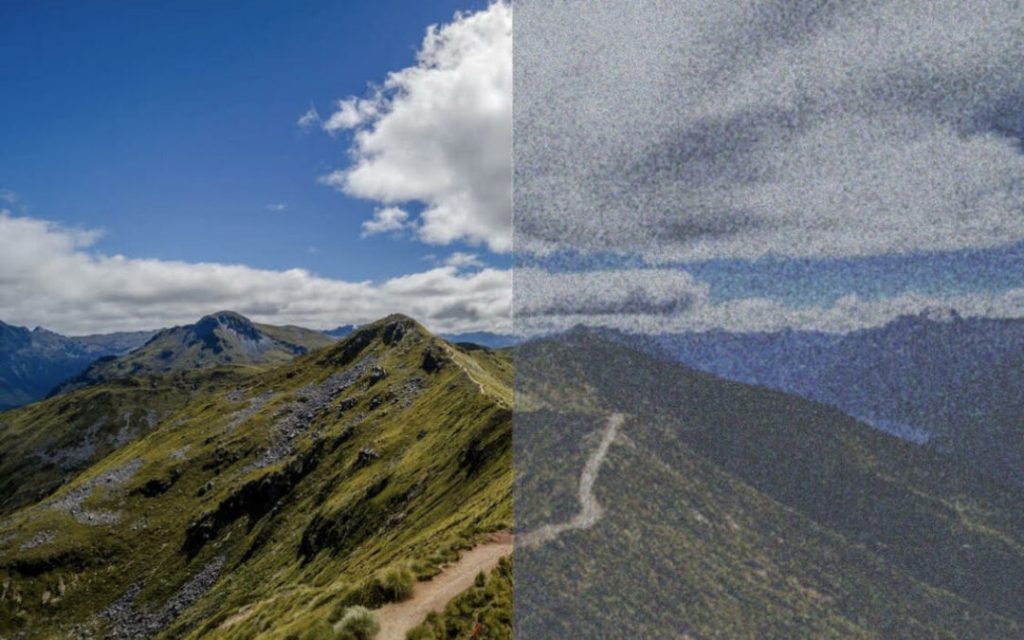Monash University: Medicine, Nursing & Health Sciences
Associate Professor Joanne Fielding and colleagues are making headway on clarifying the underlying neurological cause of Visual Snow Syndrome. We feature an overview of her recent and forthcoming research here.
A little over three years ago, Monash University Department of Neuroscience researchers Associate Professor Joanne Fielding and Professor Owen White were given a $140,000 to fund research into a neurological condition that was at the time little known and under-researched.
People with Visual Snow Syndrome see the world through a constant overlay of flickering dots passing over their entire field of vision. This persists whether their eyes are open or closed. The incurable condition is not due to eye problems – it’s caused by an unknown brain malfunction.
The donation from the US-based non-profit Visual Snow Initiative (VSI) allowed researchers in the Ocular Motor Research group, including Dr Meaghan Clough and PhD students Emma Solly and Paige Foletta, to conduct a suite of studies using simple eye movement tasks.
Associate Professor Fielding said the team had been busy, notwithstanding COVID-19. Last year, they published three papers on VSS. Two of the studies extended and supported the findings made in a breakthrough 2020 paper published in Neurology that found that people with VSS moved their eyes much faster than healthy controls towards a suddenly-appearing visual stimulus, and when asked to look away were more likely to erroneously move their eyes towards the stimulus.
“The 2020 paper provided the first evidence of objective and quantifiable behavioural changes in patients with Visual Snow Syndrome,” Associate Professor Fielding said. “It provided concrete evidence that VSS is driven by neurological dysfunction,” she said. “For a disorder that was previously considered psychogenic, this evidence is crucial validation for patients that there’s really something wrong.
“Two papers published last year validated the first set of findings, which was fabulous – it was really what we needed to drive the research further,” Associate Professor Fielding said.
Another paper published last year in Frontiers of Neurology found that people with VSS also endure a range of psychiatric symptoms. The researchers asked 125 patients with VSS to complete a battery of questionnaires assessing depression, anxiety, depersonalisation (when the person feels disconnected from their body), sleep quality, fatigue, and quality of life, as well as conducting a structured clinical interview about their visual and sensory symptoms.
They found higher rates of anxiety and depression, depersonalisation, fatigue, and poor sleep, which significantly impacted their quality of life in VSS patients compared to healthy controls. Additionally, psychiatric symptoms, particularly depersonalisation, were related to increased severity of visual symptoms.
Associate Professor Fielding said the severity and frequency of psychiatric symptoms did not differ significantly whether the person had “woken up one morning” with symptoms or whether they had experienced them lifelong.
“This speaks to some sort of central mechanism at play – VSS is not just sensory, it’s also psychiatric,” she said.
“This really adds to the clinical picture – you can’t fix VSS but there’s a range of things that clinicians can do for people with depression, anxiety or who have a sleep problem.”
The last series of studies funded by the VSI have collected 7T MRI imaging data on 40 people with VSS. From these the group has one paper currently under review with three more in preparation.
Associate Professor Fielding is seeking funding to continue the studies after the current donation runs out soon.
“I think it’s really important that we keep banging the drum about this disorder,” she said. “While the symptoms of VSS might seem to be relatively innocuous – they’re not progressive and people aren’t dying from them – they can profoundly impact a person’s quality of life.”
Ocular motor measures of visual processing changes in visual snow syndrome. Neurology September 2020 DOI: doi.org/10.1212/WNL.0000000000010372
Eye movement characteristics provide an objective measure of visual processing changes in patients with visual snow syndrome. Science Reports May 2021 DOI: 10.1038/s41598-021-88788-2
The Psychiatric Symptomology of Visual Snow Syndrome. Frontiers in Neurology July 2021 DOI: 10.3389/fneur.2021.703006
Delayed Onset of Inhibition of Return in Visual Snow Syndrome. Frontiers in Neurology September 2021 DOI: 10.3389/fneur.2021.738599


